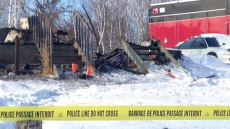TORONTO — The notion that cold-blooded killers and violent offenders are taking advantage of a soft-on-crime justice system by feigning psychiatric illness to win a verdict of not criminally responsible and avoid punishment is a myth, a new study finds.
For one thing, the study published Thursday by the Canadian Journal of Psychiatry concludes, only a tiny fraction — less than 0.2 per cent of criminal cases in a given year — will receive a verdict of not criminally responsible on account of mental disorder, which used to be known as not guilty by reason of insanity.
"(Such) cases can conjure thoughts of violent offenders faking a mental illness to avoid prison time, shortened hospital stays with early release into the community accompanied by fears the individual will reoffend," the article states.
However, data from the national trajectory project, which tracked 1,800 not-criminally responsible men and woman from May 2000 to April 2005 in Quebec, Ontario, and British Columbia, paints a much different picture.
About half of the cases involve minor assaults, property offences or other non-violent crimes, the study finds.
Repeat offences — especially involving severe violence — are extremely rare and overall recidivism is lower than that of the general prison population. In fact, people who had committed severe violent index offences were less likely to reoffend than those who had committed less severe offences.
The study found only 13 cases of severe violent reoffences.
Overall, according to the study, 17 per cent of NCR cases reoffended after three years of follow-up, roughly half the rate estimated for the general prison population. Reoffence rates are much higher, about 70 per cent, for mentally ill inmates in the general prison population.
The study also found about three in four NCR patients had been in hospital at least once for a mental-health condition — most commonly for a psychotic disorder compounded by substance abuse.
"This suggests that violence risk-assessment training and interventions to reduce further mental-health deterioration and criminal offending are a priority in civil psychiatric services," says study co-author, Anne Crocker, of McGill University.
In other findings:
— About three in four were on government assistance at the time of the offence
— One in 10 was homeless
— About half the NCR population had no prior major criminal convictions
— Most victims are family members rather than headline-grabbing crimes against strangers.
"This emphasizes the importance of supporting family members...as both potential helpers and potential victims," the study states.
The findings also appear at odds with Bill C-14, a new federal government law that transferred responsibility for violent NCR offenders from review boards to the courts.
In a guest editorial accompanying the research, Patrick Baillie, a psychologist in Alberta, called it an age-old concept that an accused should not be convicted for crimes arising from a mental disorder.
"A truly safe society does not change that established principle by incarcerating people with mental disorders — or by further stigmatizing them — but rather ensures that procedures are in place to protect both the individual and the public." Baillie says.
"What is particularly frustrating to at least some of us from a more scientific and less political background is when major policy changes occur in the absence of — and sometimes directly contrary to — what quality research has shown to be the current truth."
The ongoing national trajectory project also involves researchers from Royal Ottawa Mental Health Centre and the University of British Columbia.





